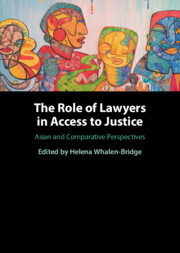Book contents
- The Role of Lawyers in Access to Justice
- The Role of Lawyers in Access to Justice
- Copyright page
- Dedication
- Epigraph
- Contents
- Figures
- Tables
- Appendices
- Contributors
- Foreword
- Acknowledgements
- Abbreviations
- 1 Understanding and Comparing Access to Justice
- Part I Access to Justice in Asia
- Part II Comparative Perspectives on Access to Justice
- 13 Access to Justice and an Islamic Ethic of Justice
- 14 Lawyering in Indonesia’s Religious Courts: Legal Aid, Procedural Justice, and Pragmatism
- 15 Access to Justice and Legal Aid in the Syariah Courts in Malaysia: A Colourful but Threadbare Patchwork System
- 16 The Syariah Court of Singapore: Achieving a More Formal Access to Justice
- 17 Access to Justice in Israel: Rights, Legal Aid, and Pro Bono in a Lawyer Dominant Environment
- 18 Vuk’uzenzele – Arise and Act: Lawyers and Access to Justice in South Africa
- Index
17 - Access to Justice in Israel: Rights, Legal Aid, and Pro Bono in a Lawyer Dominant Environment
from Part II - Comparative Perspectives on Access to Justice
Published online by Cambridge University Press: 29 September 2022
- The Role of Lawyers in Access to Justice
- The Role of Lawyers in Access to Justice
- Copyright page
- Dedication
- Epigraph
- Contents
- Figures
- Tables
- Appendices
- Contributors
- Foreword
- Acknowledgements
- Abbreviations
- 1 Understanding and Comparing Access to Justice
- Part I Access to Justice in Asia
- Part II Comparative Perspectives on Access to Justice
- 13 Access to Justice and an Islamic Ethic of Justice
- 14 Lawyering in Indonesia’s Religious Courts: Legal Aid, Procedural Justice, and Pragmatism
- 15 Access to Justice and Legal Aid in the Syariah Courts in Malaysia: A Colourful but Threadbare Patchwork System
- 16 The Syariah Court of Singapore: Achieving a More Formal Access to Justice
- 17 Access to Justice in Israel: Rights, Legal Aid, and Pro Bono in a Lawyer Dominant Environment
- 18 Vuk’uzenzele – Arise and Act: Lawyers and Access to Justice in South Africa
- Index
Summary
The last two decades have witnessed a delayed but growing awareness of the importance of access to justice. The change was led by courts and public interest lawyers, who identified obstacles blocking access for indigent people. To explain this delayed development, the chapter identifies the tension between the private legal sector who dominate the Israeli Bar and the public interest lawyer sector. Despite pressure from other stakeholders, the Israeli Bar has retained a self-regulatory scheme which primarily serves its professional and financial goals. Another major reason for late development is the lack of a statutory guarantee of the right of access to justice. Israel is a western democracy with no constitution but with a set of Basic Laws guaranteeing some rights, which do not include the right of access to justice; the right to access to justice was declared to be a constitutional right by the Supreme Court only in 2003. The chapter argues that access to justice in Israel is supported by courts and various schemes but has suffered in the lawyer dominant environment, and that serious access to justice reform will require a different balance of power among access participants.
- Type
- Chapter
- Information
- The Role of Lawyers in Access to JusticeAsian and Comparative Perspectives, pp. 310 - 326Publisher: Cambridge University PressPrint publication year: 2022

